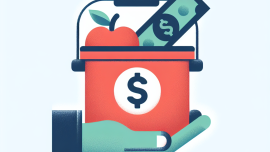
What Financial Watchdogs Can Learn from Grassroots Mutual Aid
Why Financial Regulation Matters More Than Ever in 2024
As someone who’s spent decades squinting at fine print, sitting through public hearings, and challenging banks who thought they could sneak in another “maintenance fee,” I can assure you: financial regulation is anything but boring. In fact, here in 2024, it could be one of the most critical topics for consumers, policymakers, and yes—those big institutions trying to seem friendlier than their fine print lets on.
I’m Eleanor “Ellie” Cartwright, your slightly feisty yet eternally grounded advocate for consumer rights and transparent financial policy. Let’s talk about why smart, effective financial regulation is not just a bunch of political noise—but your wallet’s best friend.
The Basics: What Is Financial Regulation Anyway?
Financial regulation refers to the rules, laws, and guidelines enacted by governing bodies to oversee financial institutions, markets, and behaviors. The goal? To ensure stability, transparency, and fairness in the financial system.
Think of it like putting rules in place for a neighborhood potluck. Without them, Liz from down the block shows up with nothing but napkins and leaves with half the casserole. In finance, regulation prevents risky behaviors, fraud, unfair lending practices, and systemic collapse.
The Key Players in 2024
- SEC (Securities and Exchange Commission): Regulates securities markets and protects investors.
- Federal Reserve: Manages monetary policy and watches over the health of the banking system.
- CFPB (Consumer Financial Protection Bureau): My personal favorite—enforces consumer protection laws for financial products like credit cards, mortgages, and loans.
- FDIC: Insures your bank deposits and examines financial institutions for compliance.
Yeah, I know. It’s like a financial alphabet soup. But trust me, each one plays a crucial role in making sure your credit card interest rate doesn’t soar just because your cat stepped on the keyboard and made a late payment.
Why 2024 Is a Turning Point
The last few years have turned the financial world on its polished head. We’ve experienced rapid inflation, new fintech innovations, a crypto rollercoaster that most of us regret riding, and expanding concerns about personal data privacy. All of this makes strong, agile regulation absolutely necessary.
1. The Rise of “Buy Now, Pay Later” and Alternative Credit Models
Regulators are just now catching up to emerging credit services like BNPL (Buy Now, Pay Later). These services often skip traditional credit checks and make it way too easy to fall into unregulated debt. In 2024, new proposals from the CFPB aim to treat these services like actual credit providers, requiring clearer disclosures and monitoring of user behavior.
2. Crypto and Digital Assets: Still Wild, Still West
Despite multiple high-profile collapses and scandals (*cough* FTX *cough*), the digital asset scene continues to grow. Both the SEC and CFTC are pushing for stronger oversight, more transparency, and clearly defined digital security regulations.
Yes, crypto bros may complain about “stifling innovation,” but I’m here for stopping scams, rug pulls, and false promises before they drain another grandmother’s life savings.
3. AI In Finance: Helpful or Harmful?
Financial institutions are increasingly using AI for risk assessments, underwriting, and customer service. While this might sound sleek and efficient, biases embedded in AI algorithms can lead to discriminatory lending decisions. Concerned? You should be.
Agencies are now pushing for more testing, transparency, and accountability in automated decision-making. Regulatory frameworks in 2024 aim to ensure AI acts as an assistant, not a biased gatekeeper.
How Regulation Protects the Consumer (That’d Be You)
Okay, let’s get personal. Why should you care whether there’s a 2,000-page report sitting on a senator’s desk right now?
1. It Keeps Predatory Practices in Check
From payday loan traps to misleading mortgage clauses, bad actors love a loosely enforced market. Regulation shines a light where they like to hide—and gives enforcement arms the power to act swiftly.
2. It Ensures Your Money Is Safe
Without deposit insurance? Your bank failing could cost you everything. Without reporting requirements? A hedge fund could collapse overnight and take your retirement fund with it. Safety nets like the FDIC exist because regulation demanded them.
3. It Makes Financial Products Easier to Understand
You deserve plain English disclosures—no asterisks, no riddles. Regulatory agencies are working harder (and taking more public feedback) to crack down on “junk fees,” confusing terms, and deceptive fine print.
What Can You Do? Yes, You Have Power
Financial regulation isn’t just a Washington thing. It gets shaped by data—and by people who speak out. Want to stay informed and protect your interests?
- Read before you sign. Even if it’s 30 pages. Especially if it’s 30 pages.
- Report shady behavior. CFPB.gov makes it easy and meaningful.
- Join public commentary periods. Agencies ask for input. Make your voice matter.
- Support organizations that advocate for transparency and fairness.
- Vote for representatives who prioritize consumer protection.
I know, it’s not as glamourous as binge-watching a new docuseries you’re going to forget next week. But trust me, the impact lasts way longer.
The Bottom Line
Here’s the deal: financial regulation is not about red tape—it’s about fairness, safety, and empowering consumers. As we navigate this complex, tech-driven money landscape of 2024, experienced oversight isn’t optional. It’s essential.
So the next time someone tells you regulation is “anti-business,” remind them that without ground rules, the game becomes unplayable for the everyday consumer. And, if all else fails, send them my way—I’ve got a 50-slide presentation and a triple-shot espresso with their name on it.
For more insights like these, visit our About Us page or reach out directly through our Contact Page. We’re always ready to advocate, explain, and empower.









Leave a Reply